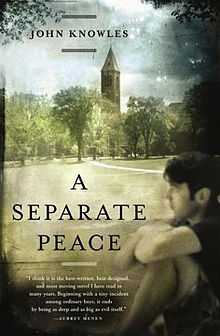John Knowles
| John Knowles | |
|---|---|
| Born |
John Knowles September 16, 1926 Fairmont, West Virginia, U.S. |
| Died |
November 29, 2001 (aged 75) Ft. Lauderdale, Florida, U.S. |
| Residence | Southampton, New York |
| Nationality | American |
| Education |
Yale University Phillips Exeter Academy |
| Occupation | Writer |
| Known for |
Peace Breaks Out (1981) A Separate Peace (1959) |
| Awards | William Faulkner Foundation Award (1961) |
John Knowles (/noʊlz/; September 16, 1926 – November 29, 2001)[1] was an American novelist best known for A Separate Peace (1959). He died in 2001 at the age of 75.
Biography
Knowles was born in Fairmont, West Virginia, the son of James M. Knowles, a purchasing agent from Lowell, Massachusetts, and Mary Beatrice Shea Knowles from Concord, New Hampshire. His father was vice president of a coal company, earning an income which afforded them a comfortable living.[2] Knowles attended Oyster Bay High School in Oyster Bay, New York from 1940 until 1942, before continuing at Phillips Exeter Academy in Exeter, New Hampshire, graduating in 1945.
Following his time at Phillips Exeter, Knowles spent eight months serving in the U.S. Army Air Forces in World War II. At the age of 19, he married Beth Hughes.
Knowles graduated from Yale University as a member of the class of 1949. While at Yale, Knowles contributed stories to campus humor magazine The Yale Record[3] and served on the board of the Yale Daily News during his sophomore, junior and senior years, notably as editorial secretary during his senior year. He was a record-holding varsity swimmer during his sophomore year.
Early in Knowles's career, he wrote for the Hartford Courant and was assistant editor for Holiday magazine. With encouragement from Thornton Wilder, he concurrently began writing novels.[4]
A Separate Peace

A Separate Peace was first published in London by Secker and Warburg in 1959. Published in New York in 1960 by Macmillan, it would be his most celebrated work.
The novel is based upon Knowles's experiences at Phillips Exeter Academy. The setting of "The Devon School" is a thinly veiled fictionalization of it, with both campus and town easily recognizable. Although the plot is not autobiographical, elements of the novel stem from personal experience, including Knowles' membership in a secret society, and sustaining of a foot injury while jumping from a tree during society exercises. In his essay, "A Special Time, A Special Place," Knowles wrote:[5]
The only elements in A Separate Peace which were not in that summer were anger, violence, and hatred. There was only friendship, athleticism, and loyalty.
The secondary character Finny (Phineas) is the best friend of the main character Gene. Knowles has stated that he modeled Finny on David Hackett from Milton Academy, whom he met when both attended a summer session at Phillips Exeter Academy. Hackett was a friend of Robert Kennedy's, under whom he later served in the U.S. Justice Department. A student called Phineas Sprague lived in the same dormitory as Knowles during the summer session of 1943 and may have inspired the character's name.
In his memoir Palimpsest, Gore Vidal acknowledges that he and Knowles concurrently attended Phillips Exeter Academy, with Vidal two years ahead. Vidal states that Knowles told him that the character Brinker is based on Vidal. "We have been friends for many years now," Vidal said, "and I admire the novel that he based on our school days, A Separate Peace."[6]
Awards
Winner of the William Faulkner Award and the Rosenthal Award of the National Institute of Arts and Letters.
Selected works
- A Separate Peace (novel), London, Secker & Warburg, 1959; New York, Macmillan Co., 1960
- Morning in Antibes (novel), New York, Macmillan, 1962
- Double Vision; American Thoughts Abroad, New York, Macmillan, 1964
- Indian Summer, New York, Random House, 1966
- Phineas; six stories, New York, Random House, 1968
- The Paragon (novel), New York, Random House, c. 1971
- Spreading Fires, New York, Random House, 1974
- A Vein of Riches, Boston, Little Brown, 1978
- Peace Breaks Out (novel), New York, Holt, Rinehart and Winston, 1981
- A Stolen Past, New York, Holt, Rinehart and Winston, 1983
- The Private Life of Axie Reed, New York : John Knowles, 1986
- A Special Time, A Special Place, Exeter Bulletin, 1995 (autobiographical note on internet)
References
- ↑ John Knowles Biography – Biography.com
- ↑ Rowe, Gabriell. “John Knowles.” Magill’s Survey of American Literature. EBSCO. Web. 3 Nov. 2010
- ↑ Bloom, Harold, ed. (2009) Bloom's Modern Critical Interpretations: John Knowles's A Separate Peace. Infobase Publishing. Chronology, p. 111.
- ↑ Gradesaver -- John Knowles
- ↑ John Knowles. "A Special Time, A Special School". Retrieved 2012-04-04.
- ↑ Goodreads -- John Knowles
External links
| Wikiquote has quotations related to: John Knowles |